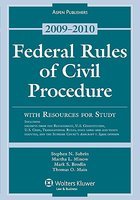« Real Heroes: Parker Posey | Main | Les Bouquinistes »
March 19, 2010
Some key FRCP deadlines changed in big ways on December 1, 2009.

Be serious. The 10-day post-trial deadline is now 28 days? While the work of the Judicial Conference's five Advisory Committees never really stops, big changes to federal court rules, including the Federal Rules of Civil Procedure (FRCP), don't occur that often. The newest amendments are "technical amendments"--but the changes are anything but technical.
Two years in the making, the changes were signed into law (H.R. 1626) by the President on May 7, 2009, and became effective December 1, 2009. There are also significant changes to some of the time triggers in the appellate, criminal and bankruptcy rules. All are part of the Judicial Conference's "Time-Computation Project".
FRCP. Rule 6, FRCP, the general "time counting" provision, and post-trial Rules 50, 52, and 59, are among the rules changed. Gone forever in Rule 6 is the much relied-upon (and, for many, much beloved) "11-day rule" in subdivision 6(a) adopted in 1985. It was designed to take the hardship out of 10-day post trial deadlines, i.e., don't count weekends and holidays for deadlines of 10 days or less.
But you no longer even need the 11-day rule that was in subdivision (a) of Rule 6.
In the new provisions, the Advisory Committee on Rules of Civil Procedure gave litigants more time (a lot more) to file motions for judgment, or for a new trial, under Rules 50 and 59. Beginning on December 1, the time to file after entry of judgment was 28 days rather than 10 days.
Sources. The D.C office of Chicago-based Mayer Brown published an advisory to the in-house community on November 30, 2009. It summarizes changes to the civil and appellate rules. See also the April 2009 summary at Smart Rules. The popular Cornell Law School site on the federal rules put up all the FRCP changes by December 1, but is still working on getting the Advisory Committee Notes into it.
The most complete Advisory Committee history and Congressional legislative history of the amendments are at the federal rulemaking section of the U.S. Courts website.
(from a December 16, 2009 post)
Posted by Holden Oliver (Kitzbühel Desk) at March 19, 2010 04:59 AM